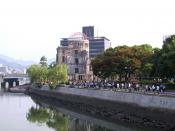Hiroshima and Japan
Hiroshima as History:Some
Preliminary Thoughts
History did not end in 1945, just as it did not end in 1989, when Francis Fukuyama announced history's demise by noting democracy's victory in the Cold War with the breakup of Soviet influence in eastern Europe. Although nuclear tensions did not end history in 1989, one would surely be forgiven for concluding that history did indeed end when the first atomic bomb was dropped on Hiroshima on August 6, 1945. Since that date, there have been innumerable accounts of this first use of an atomic weapon. There are Hiroshima diaries, Hiroshima epitaphs, museums and mausoleums to Hiroshima, and Hiroshima notes. But while Hiroshima has left behind records, legacies, and photographs, surprisingly I have yet to discover a history of Hiroshima. In fact, a search of the University of Illinois library holdings in both English and Japanese turned up only one book on the history of Hiroshima (other than local histories of the area), but it turned out to be a mistake!
The reasons for this absence of a history of Hiroshima are many and complex.
Surely, part of the explanation lies in the way postwar Japanese have elevated Hiroshima to the status of an international city, a city whose very name is often transliterated in the katakana script usually reserved for foreign names, a city that belongs to the world as an undying symbol of peace, rather than to Japan exclusively. The international interest in Hiroshima and its development as a mecca for peace activists has, however, complicated the significance of Hiroshima for Japanese themselves. Much of the discussion on Hiroshima that we hear in the media is either from non-Japanese, especially Europeans and Americans, or from Japanese who quite consciously address the interests and expectations of what they perceive as...


